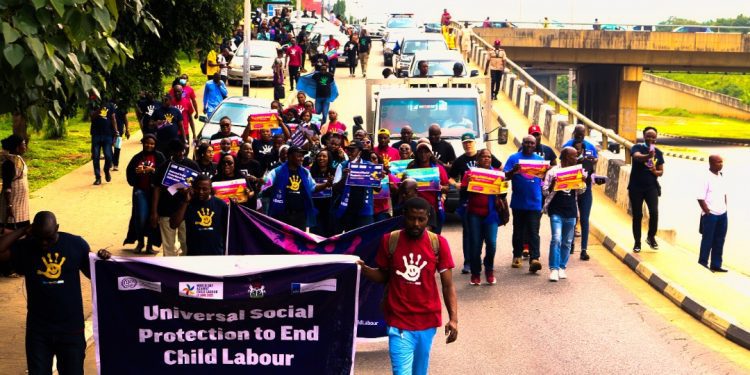A recently conducted research by the International Labour Organization (ILO) research in partnership with the United Nations Children’s Fund (UNICEF) on “The role of social protection in the elimination of child labour’ has revealed that 1.5 billion children worldwide, aged 0-14, receive no family or child cash benefits while more than 160 million children (1 in 10 children aged 5-17) are still engaged in child labour, and progress has stalled since 2016.
The key findings of the report were highlighted at the Commemoration of the World Day Against Child Labour (WDACL), themed “Universal Social Protection to End Child Labour”, which was held in Abuja.
UNICEF Country Representative Peter Hawkins, who was represented at the event by the UNICEF Acting Chief of Social Policy, explained that “Social protection is not only about human rights and dignity, but it is a smart public investment choice. A country that invests in its people, particularly children, also invests in its future and development.”
According to the UNICEF Country Rep., 14 million children in Nigeria were engaged in child labour before the Covid-19 pandemic and there are indications that the social and economic impacts of the pandemic have increased the numbers significantly.
Dr. Chris Ngige, the Minister for Labour and Employment highlighted the social protection efforts of the government as – diversification into agriculture, social investment programmes, and review of existing legal frameworks to combat child labour including the ratification of ILO Conventions No. 138 on the minimum age for work, and Convention No. 182 on the worst forms of work.
In addition, the Minister acknowledged the financial and technical support given by the ILO for the conduct of the Child Labour/Forced Labour Survey and the review of the National Policy and National Action Plan on the Elimination of Child Labour and Forced labour (2021 – 2025).
Dr. Ngige further urged the media to ensure improvements in the coverage of issues related to child labour, forced labour, human trafficking, and modern slavery to support the effective elimination of the vices from Nigeria by 2025, in line with Sustainable Development Goal Target 8.7.
Speaking, Nike Ajala, a representative of the Nigeria Employers Consultative Association (NECA) representative underscored the importance of institutionalized and effective social protection programmes in ensuring that children are allowed to fulfil their full potential.

